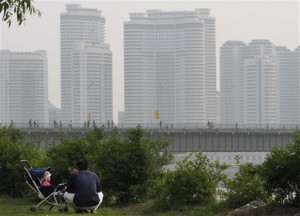North Korea suffering severe drought—state media

In this May 13, 2012, photo, a North Korean family rests on a grassy spot near the skyline of a newly developed area of Pyongyang. North Korea is suffering a prolonged and widespread drought, according to state media. If it persists to the end of the month, it will be the driest May in 50 years in western coastal areas, says the Korean Central News Agency. The drought raises fears it will worsen already dire food shortages in the impoverished communist country. AP PHOTO/KIM KWANG HYON
SEOUL—North Korea is suffering a prolonged and widespread drought, state media says, raising fears it will worsen already dire food shortages in the impoverished communist country.
If the unusually dry weather persists to the end of the month, it will be the driest May in 50 years in western coastal areas, the Korean Central News Agency (KCNA) said, warning: “The drought is expected to get more serious.”
The Rodong Sinmun newspaper urged workers and government employees to help farmers in their struggles to ease crop damage from the long dry spell.
“Severe drought is continuing throughout the country,” the daily said on its website in an article posted on Friday.
“The fight against drought is a race against time. All sources of water must be developed and used efficiently.”
Article continues after this advertisementEssential rice and corn planting had been badly affected, it said, and wheat, barley and potato fields had been damaged.
Article continues after this advertisementReclusive North Korea suffers chronic food shortages, but the situation is frequently exacerbated by floods, droughts and mismanagement.
The official food distribution system, part of the state-directed but moribund economy, largely collapsed during the famine years of the mid- to late-1990s.
There are no official tallies, but hundreds of thousands of North Koreans are believed to have died in the famine.
International food aid has dwindled due to rows over the North’s missile and nuclear programs. The United States suspended a plan to deliver 240,000 tons of food after the North’s latest rocket launch, on April 13.
One US aid group warned that more than two million children would go hungry in North Korea as a result.
In a separate article, the Rodong Sinmun said tens of thousands of workers in the northern city of Sinuiju swarmed to the fields to help farmers irrigate badly dried-out land.
And in the northwestern city of Hwangju, workers and farmers were struggling to repair existing wells and dig new holes, it said.
KCNA said the western coastal areas had experienced “a long spell of dry weather.”
“This is an abnormal phenomenon witnessed in the country in fifty years, according to a report of the hydro-meteorological service,” KCNA said.
There has been little rainfall in the country since the end of April, it said. Just two millimeters has fallen on the capital Pyongyang in the past 30 days.